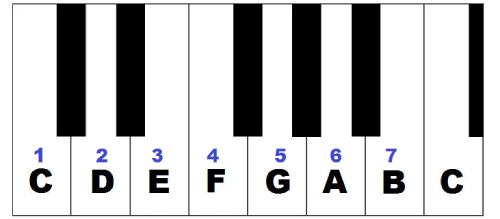Are you thinking of producing music but do not know anything about music? Are you wondering if it is worth trying to create a song or beat before learning any music theory? Do you need music theory to produce music?
No, you do not need to know music theory to produce music; however, knowing some will help tremulously. The more music theory you know the more easily it becomes to express ideas, produce songs, incorporate additional complexity, and improve communication with other artists.
In this article, I will go through if you need to know the theory to produce music and where you should start if you do want to learn some music theory.
Why Don’t You Need Music Theory To Produce Music?
Music theory is not required to produce music because you can either create it using your ear or by using tools that will help assist you. During the process of learning to create music and using tools for assistance, you will begin to learn music theory by experiential learning – learning while doing.
There are free resources that can provide drums, melodic loops, chord creation, scales, and any aspect of music you feel like you lack knowledge in.
You can actually start producing professional-sounding music with all the given resources without knowing a thing about music! It’s also a great way to start learning about song structure and tempo too!

With the tools and sounds available it is possible to work on certain aspects of songs: drums, chords, melodies, etc. This is done by using a tool to do the parts of the song you are not good at (yet) so you can concentrate on learning one aspect of the song, like chord creation.
This way you can still produce music without having all the skills to do so.
Want to learn how to create a drumbeat? Grab a free sample pack and create your drums alongside a melodic loop. Not good at creating drums? Get a drum loop and create chords alongside it!

The more music you produce the more you will develop your ear which will allow you to recognize notes that are out of key, chord progressions, song structure, and tonal qualities of sounds.
How Does Knowing Music Theory Benefit You?
Music theory is beneficial for music producers because it allows you to express the music in your head into reality much easier, create more complex chord progressions, solos, and song structures, communicate with other musicians, create songs quicker, and understand what you are doing while creating music.
The best example of the benfits of music theory is this video: Autumn Leaves in 10 of Difficulty.
Thinking of the video in terms of music production, in case you do not play an instrument, is level 1 being someone that is just starting their journey learning how to make a melody.
It sounds good and would do for many cases, but when level 2 comes in you are thinking, wow that sounds much better and all it’s doing is adding the root note.
Level 3 in the video demonstrates what knowing notes in a chord can do to help bring life into a melody. This is called voicing, voicing refers to the placement of notes in a chord structure.
I won’t go through all the levels, but level 4 shows the power of knowing variations on chords, what key the song is in, and the ability to add complexity to a simple-sounding melody – which adds depth to a song.
Finally, I want to add that knowing music theory terminology will be very beneficial when you start working with others. Doing a collaboration goes much smoother if both artists are able to communicate what they’re doing in the song. You don’t need any advanced theory, just the basics.
Think about trying to communicate an idea with someone that doesn’t speak the same language. It’s hard! It’s doable but difficult. The same goes for music creation. Knowing how to communicate the key and tempo of a song will go a long way.
What Basic Music Theory Should I Learn?
Basic music theory that musicians and music producers should try to become familiar with should be: notes, major/minor keys, chords, scales, tempo, and time signatures.
Notes
Learning the notes in music should be your first prioity. It is the foundation of what everything else is based from scales to chords – even the feeling and vibe of a song!

Major/Minor
You will hear the terms major and minor in music all the time, for instance, the song Dynamite by BTS is in the key C♯ minor (also seen as C#m). Knowing this information will allow you to know what chords can easily fit within the song and what scales can be easily used.
Playing a chord progression in D minor and soloing over it with a D major scale can work, but it will feel and sound off unless you are experienced and know how to incorporate it.
| Major notation | Minor notation |
| A | Am |
| Amaj | Amin |
| A major | A minor |
The simple and quick way to think of major and minor is: major is generally seen as the happy sound, whereas minor is referred to as the sadder/darker sound. Like with all things in life, this isn’t set in stone, I can make a sound in the key of A major sound sad for instance.

Chords
Chords are a collection of notes that are played (seemly) simultaneously. For instance, a major chord contains the root(first), third, and fifth notes of the given key. Ex: C major consists of the notes C, E, G.
Theory can help us achieve a minor chord by flatting the 3rd. So, a C minor would be the root (first), flat third, and fifth notes of the C scale: C, Eb, G.
Scales
Scales are a set of notes ordered by the fundamental frequency or pitch of the key. There are major scales, minor scales, Egyptian scale, pentatonic, the list goes on! Scales will help you create melodies to go along your chord progressions or solo with your instruments.
To learn scales make sure you understand what a half step and whole step are. A half step is going from C to C# or G# to A. Whole steps would be going from C to D or E to F#.
The first scales you should take a look at should be:
- Major
- Minor
- Pentatonic
- The 7 Modes
Tempo
The tempo of a song is the rate of speed a piece of music is played at, usually communicated as BPM (beats per minute.
Songs are played at different tempos and many genres follow a similar tempo which can help you create styles of music easily when you begin to understand the tempo of them.
Summary
You do not need to know music theory to start creating music; however, learning music theory will greatly improve your workflow, expression of ideas, communication, and the overall process of making music.
When you first being making music there are many tools such as chord generators, melody generators, drum machines, drum loops, sample packs, and tutorials to help you begin making music.
And while you are making music using these tools you will learn the theory you need to learn just by doing – as you do not need to know a lot of theory, just the basics.
